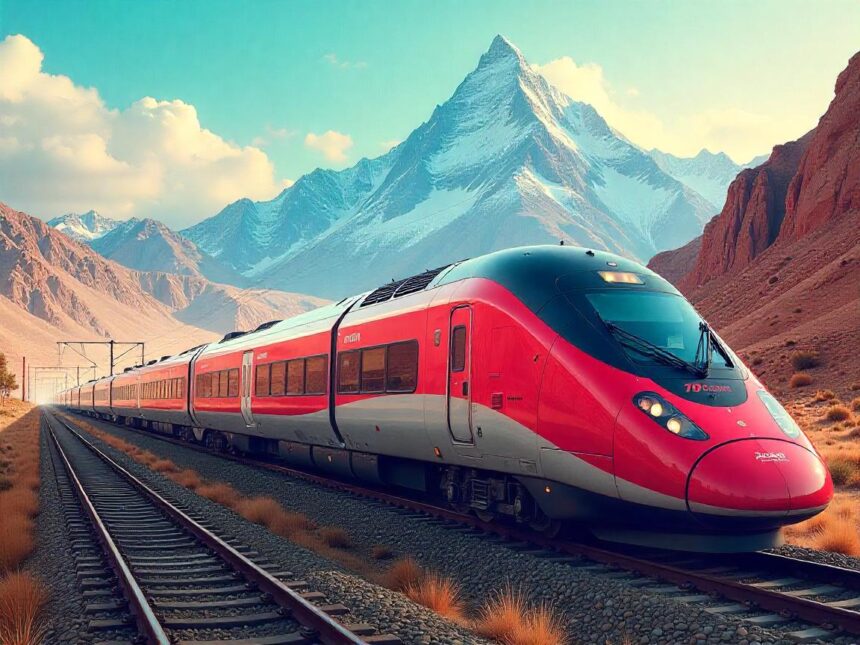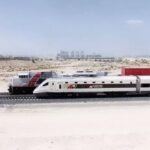Tuesday, July 1, 2025
US, Japan, Switzerland, India, Germany, China, and Saudi Arabia are all becoming a member of in a worldwide railway revolution, rewriting what it means to journey. And now, they’re not simply constructing tracks—they’re changing into the powerhouse within the journey sector. However what it’s essential know may shock you.
These nations are racing forward, pushed by velocity, expertise, and ambition. But secrets and techniques lie beneath the polished metal and buzzing engines. Why is the US pouring billions into high-speed desires? How did Switzerland good punctuality? Can India’s electrified tracks outpace China’s and Japan huge high-speed community? And what’s Saudi Arabia hiding in its desert rails?
In the meantime, Germany battles delays whilst Saudi Arabia unveils luxurious trains crossing golden sands. The stakes have by no means been larger. As the worldwide railway revolution accelerates, these powerhouses are reshaping the way forward for journey. Keep tuned—as a result of what occurs subsequent will change how the world strikes eternally.
In 2025, the rhythmic clatter of wheels on metal rails is echoing louder than ever throughout continents. As soon as seen as relics of the previous, railways are surging ahead, powered by report funding, good expertise, and a renewed quest for sustainability. However as billions pour into tracks, tunnels, and digital methods, a stark reality emerges: not all railways are on the identical monitor.
A contemporary take a look at the worldwide railway trade—and a country-by-country railway index—reveals exceptional development tales, obtrusive gaps, and the high-speed desires reshaping how we transfer. And behind the headlines, one large query looms: will rail be the engine of tomorrow’s journey revolution—or fall in need of its grand guarantees?
There’s no denying the cash pouring into world rail methods. Between freight strains crisscrossing continents and glossy passenger trains slicing by way of countryside, the rail trade is experiencing a monetary windfall.
By the tip of this 12 months, the worldwide railway market is anticipated to hit round US $658.4 billion, surging from underneath US $470 billion simply 5 years in the past. And the growth isn’t slowing: consultants forecast regular development of 6–8% yearly by way of 2030. In parallel, good railway methods—the digital nerve facilities managing all the things from ticketing to predictive upkeep—are poised to develop from US $36.5 billion this 12 months to greater than US $54 billion by decade’s finish.
However the large cash comes with large challenges. The way it’s spent—and the place—will outline the winners and losers in tomorrow’s railway panorama.
“Rail is at a crossroads,” says a transportation economist in Berlin. “The expertise is prepared, the environmental arguments are overwhelming, however the politics and funding are patchy. Some nations are sprinting ahead, others are caught within the station.”
Maybe the boldest railway story in 2025 belongs to India. As soon as outlined by smoke-belching steam locomotives and crowded sleeper coaches, Indian Railways has rebranded itself as a contemporary marvel of electrification and scale.
By April this 12 months, India reached an astounding milestone: 98.8% of its railway community is galvanized. That’s practically 68,700 km of tracks buzzing with electrical energy, slashing diesel dependency and greenhouse fuel emissions. This achievement locations India among the many greenest rail networks on the planet.
India’s trains now carry 6.9 billion passengers yearly and 1.6 billion tonnes of freight, connecting far-flung areas and fuelling the economic system. And the push is much from over. With US $22 billion earmarked for additional modernization and security in 2025 alone, India’s railway story is a logo of ambition—and transformation.
“We wish our trains to be quicker, safer, and greener,” mentioned a senior official from Indian Railways. “Our objective is not only nationwide connectivity however world competitiveness.”
Europe, the religious dwelling of the high-speed prepare, presents a examine in contrasts.
Switzerland stands because the continent’s golden little one. Its railways are practically flawless—punctual, electrified, and deeply built-in into every day life. Swiss trains run like clockwork, making the nation the undisputed #1 in Europe’s Railway Index. Commuters glide between cities on clean rides, whereas freight trains preserve items transferring throughout mountain passes with minimal carbon footprint.
However elsewhere in Europe, the tracks inform a distinct story.
Germany, as soon as Europe’s rail powerhouse, is mired in delays and infrastructure woes. This 12 months, solely 72% of Germany’s long-distance trains arrive on time, down considerably from pre-pandemic highs. Deutsche Bahn faces a €92 billion infrastructure backlog, with bridges, switches, and sensors badly in want of substitute.
Even high-speed routes like Berlin–Munich see higher outcomes (82.5% on time), however nationwide cracks within the system are exhausting to disregard. Regardless of requires funding, Germany spends far much less per capita on rail infrastructure than neighbors like Austria and Switzerland.
“It’s embarrassing,” laments a frequent German rail traveler. “We’re the financial engine of Europe, but our trains can’t run on time.”
Throughout the Channel, the UK’s railway saga grows extra advanced. The federal government’s plan for Nice British Railways—a sweeping nationalisation challenge—continues to be in limbo. Operational effectivity is low, with seat occupancy hovering round 35% and driver utilization charges caught close to 40%. Delays stay power, with public frustration peaking as stations are actually mandated to show stay cancellation and delay statistics.
Whereas high-speed ambitions proceed (together with HS2 development), political infighting and funds overruns have left Britain’s railways trailing behind their European friends.
On the opposite aspect of the Atlantic, the US tells two railway tales.
First, the freight rail sector stays a mighty spine of the U.S. economic system. Railroads transfer coal, automobiles, and containers throughout hundreds of miles, with intermodal site visitors (vans and containers using trains) persevering with 21 consecutive months of year-on-year development. In Could alone, freight site visitors rose practically 6% after a sluggish begin to 2025.
But in relation to passenger rail, America lags. Amtrak, the nation’s solely nationwide passenger rail service, is recovering—28.6 million passengers in FY 2023, up 25% from the earlier 12 months. However in comparison with Europe or Asia, U.S. high-speed rail is just about non-existent exterior the Northeast Hall.
Because of the Infrastructure Funding and Jobs Act (IIJA), US $66 billion is earmarked for rail upgrades by way of 2026. New corridors are deliberate in California, Texas, and the Midwest. However many consultants concern the nation nonetheless lacks the political unity—and public enthusiasm—to duplicate Europe’s high-speed success.
Asia’s rail ambitions proceed to dazzle.
Along with India’s electrification success, China stays the worldwide titan of high-speed rail. Its community now stretches past 45,000 km, linking cities in hours that when took days. In the meantime, nations like Japan, South Korea, and even Thailand are increasing high-speed strains, vying for regional connectivity and tourism development.
Japan’s latest Shinkansen fashions boast gorgeous speeds and enhanced earthquake resilience. And in Southeast Asia, main initiatives just like the Thailand–China high-speed railway goal to rework journey and freight throughout borders.
Asia’s strategic push might place it because the world chief in railway expertise—and sustainability.
Amid Saudi Arabia’s blazing desert solar, a brand new form of revolution is racing throughout metal rails. Trains, as soon as uncommon within the Kingdom’s transport narrative, have change into symbols of nationwide ambition and world imaginative and prescient. In 2025, Saudi railways aren’t merely tracks within the sand—they’re engines of city connectivity, tourism innovation, and financial transformation.
So what’s fueling this rail-powered surge? And the place is all of it heading?
In simply the primary quarter of 2025, over 35 million passengers climbed aboard Saudi trains—a staggering quantity for a rustic that, not way back, barely had passenger rail in any respect.
The lion’s share of those rides got here from city networks just like the Riyadh Metro, which alone noticed 25 million passengers in three months. Jeddah’s airport shuttle contributed one other 6 million, proving that Saudi commuters are embracing trains as a part of every day life.
Past metropolis limits, intercity rail additionally made a splash. The Haramain Excessive-Velocity Railway, connecting Mecca and Medina, continues to thrive. It’s change into not only a transport hyperlink however an icon—slashing journey occasions and redefining pilgrimage logistics.
On the coronary heart of this rail revival stands the Riyadh Metro, the world’s longest driverless metro system. Its gleaming silver trains zip by way of tunnels and elevated tracks, spanning 176 km and 85 stations.
Launched in late 2024, the system shortly proved its price, dealing with practically 2 million passengers in its opening week alone. In January 2025, it expanded additional with the debut of the Orange Line (Line 3)—a 40.7 km route that slices east to west throughout town.
For Riyadh’s swelling inhabitants, the metro isn’t simply handy—it’s transformative, easing congestion, shortening commutes, and symbolizing Saudi Arabia’s leap into trendy city dwelling.
Saudi Arabia’s rail ambitions stretch far past metropolis limits. The Saudi Landbridge Mission plans to attach Jeddah on the Pink Sea to Riyadh and onward to the Gulf. Whereas full development continues to be pending, progress is seen.
The broader dream? A seamless GCC railway community, knitting Saudi Arabia to neighbors just like the UAE, Oman, and Qatar. Already, Saudi has accomplished strategic strains resembling the brand new Dammam–Jubail freight hall, bolstering regional logistics and commerce.
If absolutely realized, this net of metal tracks might redefine Gulf transportation, shifting freight from vans to rails and providing passengers quick, border-spanning journeys.
Saudi railways aren’t nearly velocity and scale—they’re additionally eyeing luxurious tourism. By late 2025, the Kingdom will launch the “Dream of the Desert,” a glamorous prepare designed by Italy’s Arsenale Group.
With 40 elegant cabins, it would glide from Riyadh to Al Qurayyat over 800 miles of golden dunes and rugged landscapes. The challenge blends five-star hospitality with cultural storytelling, aiming to lure high-end vacationers looking for unforgettable experiences.
It’s greater than a prepare; it’s a rolling promise that Saudi Arabia generally is a premier vacation spot for luxurious tourism.
Saudi Arabia’s railway story in 2025 reads like a manifesto for its Imaginative and prescient 2030: trendy, sustainable, and globally linked. With passenger numbers hovering, freight rising, metros remodeling cities, and luxurious trains engaging vacationers, the rails are buzzing with function.
But challenges stay. The huge Landbridge Mission calls for flawless execution. Regional cooperation for the GCC railway should overcome political and logistical hurdles. And sustaining momentum as initiatives shift from paper to metal will check Saudi Arabia’s resolve.
Nonetheless, the alerts are clear: the Kingdom’s railways are blazing new trails—turning sand into metal and ambition into movement.
Past metal and sleepers, the true revolution is digital.
Rail operators worldwide are investing in good railway methods, integrating:
IoT sensors to detect monitor faults earlier than accidents happenAI algorithms to optimize schedules and passenger flowsBlockchain for safe ticketing and freight trackingEdge computing for real-time analytics on transferring trains
By 2030, good rail methods will exceed US $54 billion, remodeling trains into rolling knowledge hubs. International locations that make investments right here will climb the Railway Index quick, gaining effectivity and passenger loyalty.
So the place does the railway trade stand in 2025?
It’s a narrative of exceptional progress—and chronic gaps. Electrification and high-speed enlargement level towards a greener, quicker future. However underinvestment, political turmoil, and operational failures threaten to derail progress in elements of Europe and the U.S.
But for billions worldwide, trains stay the spine of sustainable journey, providing a lifeline for freight, commuting, and tourism. From India’s buzzing electrical strains to Switzerland’s flawless timetables, railways show that trendy journey might be each environment friendly and enchanting.
All aboard—for the following cease in rail’s unimaginable journey.
«Loved this publish? By no means miss out on future posts by following us»






